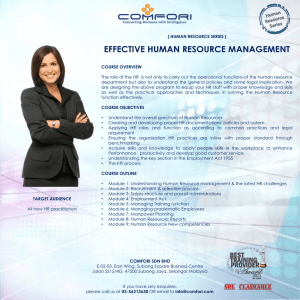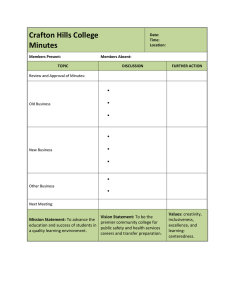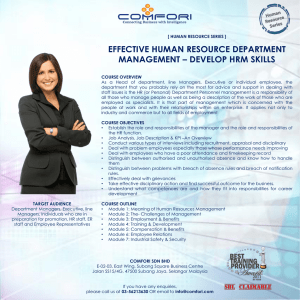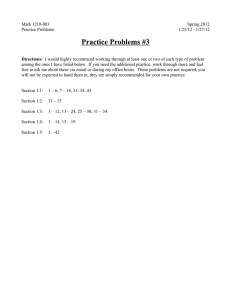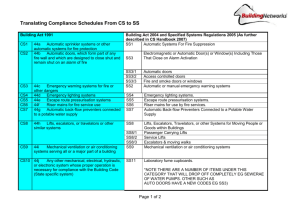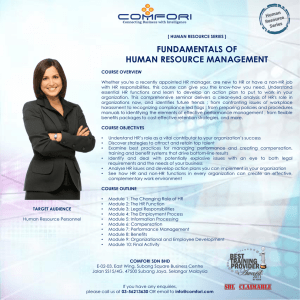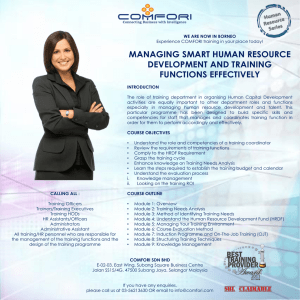Improving Provision Quality Assurance
advertisement
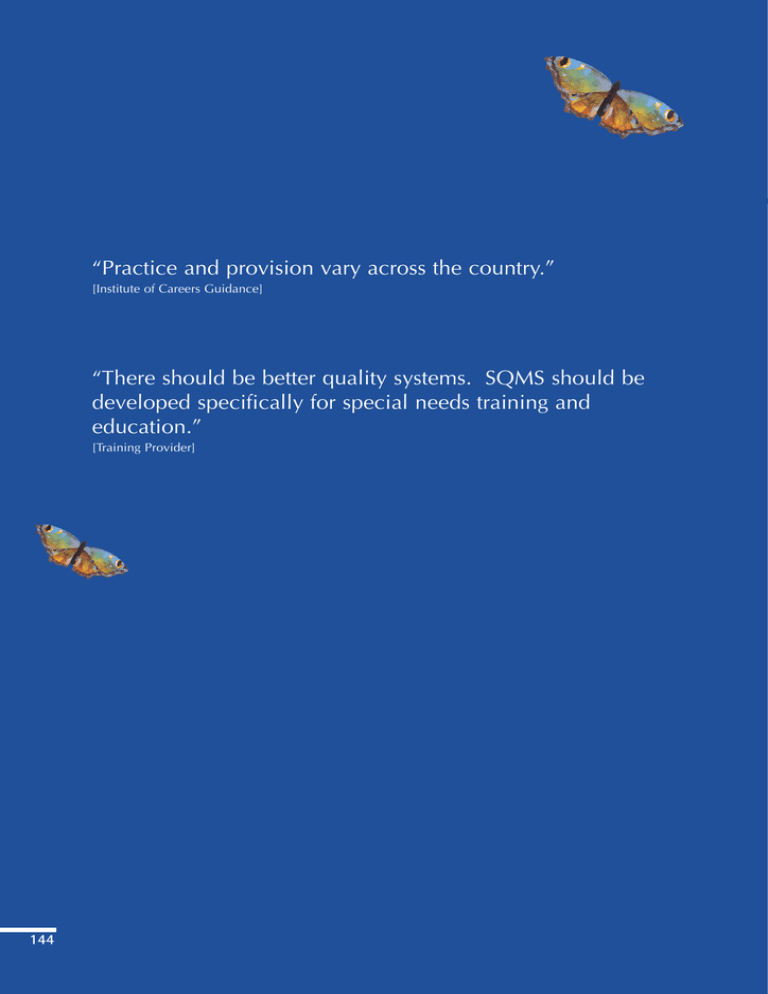
Improving Provision Quality Assurance “Practice and provision vary across the country.” [Institute of Careers Guidance] “There should be better quality systems. SQMS should be developed specifically for special needs training and education.” [Training Provider] 144 144 12 Improving Provision Quality Assurance The Issue 12.1 The Committee is aware from its wide-ranging consultations that there is variation in the type and quality of provision across Scotland. Our vision of Inclusiveness is one where providers of education and training should place the young person at the centre of the design and delivery of their provision. There are two issues: • how to ensure that young people have access to the highest possible quality of provision; and • how to ensure a consistent quality of provision which is not dependent on which learning route young people take, or on the location of the learning environment. 12.2 The challenge for agencies and organisations who provide education and training and other forms of support is to ensure that there is continuous quality improvement both within, and across organisations. This is essential to enable young people with additional support needs to have access to the highest possible quality of provision. The Committee’s View 12.3 The Committee recognises that the FE and training sector and other organisations working with young people already have a well-developed range of quality assurance arrangements. We recommend that these quality arrangements are built on, and where appropriate, adapted to promote Inclusiveness. Building on Current Arrangements 12.4 HM Inspectors (HMI) monitor standards and quality in further education and community education as well as schools. The Committee welcomes the development of self-evaluation in schools through the performance indicators in “How Good is our Schools”. We also welcome the plans outlined in the Government’s Lifelong Learning Paper “Opportunity Scotland” to improve and streamline quality assurance arrangements in both the statutory and voluntary sectors of community education. This work is being taken forward on a partnership basis by local authorities, voluntary organisations and HMI building on current arrangements. We recommend that the partners ensure that the new quality assurance arrangements take account of learners with additional support needs. 145 Improving Provision Quality Assurance 12.5 A new model of quality assessment and improvement for colleges was introduced by HMI in 1995 and a revised version in 1998. “Quality Matters” is a quality framework against which colleges are required to carry out self–evaluation. The quality indicators are cross-referenced with the Scottish Quality Management Systems (SQMS), developed by the enterprise networks to ensure quality in the national training programmes, and now used by many education and training providers, and all careers service companies. 12.6 We were encouraged to note that all colleges responding to the Committee’s FE Survey said that they had measures in place to monitor the quality of provision, with the main method being course evaluation and review. 12.7 Colleges undertake reviews of their work through, for example: • internal audit of their systems and procedures; • staff development and review; • setting and reviewing annual development planning targets, including targets for quality development; • course team reviews; • analysis of performance indicator data including student achievement, client satisfaction and post-course success. 12.8 The HMI quality framework is written in Inclusive terms and applies to all learners. References to people with particular learning or support needs are incorporated into the framework. For example, the Lifelong Learning section refers to the “guidance tutor system and referral procedures to meet the needs of learners”; the section on Accommodation, equipment and materials (C2) refers to access for disabled people; and the section on Staff (A4) asks whether “ teaching is responsive to a range of needs”. The Lifelong Learning section focuses particularly on wide access, effective support, and guidance and advice for progression. 12.9 Self-evaluation by colleges is verified by HMI through independent inspection on a 5-year cycle. The inspection and self evaluation process grades performance as: 146 • very good: major strengths are evident; • good: strengths clearly outweigh weaknesses; • fair: in need of improvement in important aspects; • unsatisfactory: major weaknesses are evident. Gradings are intended to be used as a basis for quality improvement rather than adherence to minimum standards of compliance. 12.10 HMI carry out thematic inspections as well as full college inspections. “Equally Successful”, published in 1996, reported on an inspection of provision for students with learning difficulties and disabilities in further education colleges in Scotland. Among the recommendations were that colleges should: • improve the quality of information on the learning opportunities; • ensure that procedures for identifying learning support needs are carried out in time for support measures to be in place at the start of the course; • improve the efficiency and the effectiveness of collaboration, recognising it as an essential component of good provision; • extend the role of learning support specialists to providing advice, consultancy and staff development to subject specialists so as to ensure a consistent approach across college and to raise levels of competence in the whole staff complement; • develop policies which address the needs of students with learning difficulties and disabilities across all aspects of college operation; • identify and meet staff development needs and ensure that existing competence is recognised through certification, where appropriate; • develop quality assurance measures, where necessary, to cover delivery of learning support and extended learning support. 12.11 The Committee believes that, as part of self-improvement, colleges should assess their progression towards Inclusiveness. We therefore recommend that, as a first stage, the SFEFC and HMI review the extent to which the recommendations in “Equally Successful” have been already been met. We also recommend that the new Quality Framework being developed by SFEFC should specifically assess how well colleges are providing an Inclusive learning environment. 12.12 The following quality elements in “Quality Matters” could be built on: A: Student experience A1 Programme design: this is concerned with how responsive the college programmes are to changing client needs. A5 Teaching process: this is concerned with the quality of learning and teaching. A6 Assessment: this is concerned with the quality and management of assessment. 147 Improving Provision A8 Quality Assurance Guidance and learner support: this is concerned with the extent to which students follow suitable programmes and receive support which leads to success. B: Lifelong learning: This is concerned with the quality of the college’s contribution to lifelong learning through its arrangements for access, support and progression. C: Management and quality assurance C1 Corporate management: This is concerned with the college’s approach to policy formulation, planning, implementation and review. C2 Accommodation, equipment and materials: This is concerned with the quality of the college accommodation, equipment and materials. C3 Management of College Accommodation: Equipment and Materials – this is concerned with how accommodation, equipment and materials are managed. C4 Staffing: this is concerned with the adequacy of staff resources, and the deployment and development of staff. C5 Quality assurance: This is concerned with the college’s arrangements for ensuring that quality standards are effectively specified and met. C6 Quality improvement: this is concerned with the extent to which the college actively pursues continuous improvement in the quality of its provision. Scottish Quality Management System 12.13 SQMS is an audit based system and is a contractual requirement for all training providers and colleges acting as training providers who deliver Skillseekers and Training for Work. SQMS is also a requirement for all careers service companies in Scotland. SQMS combines internal audit (self-assessment) and external audit and brings together best practice from a range of quality systems (HMI, SQA, IiP and ISO 9000). SQMS can be cross-referred to other quality standards, helping to reduce the “audit burden” on education and training providers. 12.14 An independent SQMS unit (SQMS Scotland) has recently been established to run the external audit process including the appointment, training and professional updating of auditors. A SQMS Standards Council with representation from SOEID, SE, HIE, SQA, careers service, further education and training providers and employers will oversee the work of the unit. The SQMS Standards Council will be responsible for developing, maintaining and reviewing the SQMS standards. 148 12.15 SQMS is recognised as a comprehensive and robust set of standards for vocational training and the careers service. It is also used by a range of other organisations and is well regarded. The Committee believes that SQMS should be built on and enhanced in order to specifically assess the quality of provision for people with additional support needs. Some standards (such as 11b used by careers service companies) already take account of clients with additional support needs. We recommend that SQMS be further developed to assess Inclusiveness, i.e. for training providers, how well the design and delivery of training is matched to the needs and abilities of the individual; and for careers service companies, how well guidance meets the needs of the individual. We also recommend that the new SQMS Standards Council review the quality standards to assess more specifically how well organisations are providing an Inclusiveness approach to training and guidance. 12.16 There are 14 SQMS standards used by education and training providers and 11 standards used by careers service companies. The Committee has identified the relevant SQMS standards which could be further developed and these are outlined below: Training Providers and Colleges Staffing: The structure, level, and type of staffing is appropriate for the education and training services provided. (Standard 4) Staff Development: Staff development provision meets organisational and individual needs. (Standard 5) Guidance Services: The needs of individual learners are identified, action plans/personal training plans are formulated, progress is reviewed and support is provided where needed. (Standard 11) Programme design: The outcomes and content of programmes are relevant; forms and structure encourage access and are responsive to needs; learning and assessment methods are appropriate to the aims and purposes of the programmes. (Standard 12) Programme delivery: Training and teaching is purposeful and there is attention to the needs of individuals; the methods used are appropriate, emphasise activity and responsibility, and are varied. (Standard 13) Assessment for certification: Assessment instruments allow evidence of all candidates’ sustained competence to be gathered; the evidence conforms with the standards required by the awarding body; assessment is internally verified; awarding body requirements for external verification are met; there is an appeals system. (Standard 14) Careers Service Companies Staffing: The structure, level and type of staffing are appropriate for the career service. (Standard 4) 149 Improving Provision Quality Assurance Staff development: Staff development provision meets organisation and individual needs. (Standard 5) 12.17 The following standards already take account of people with additional support needs: • Careers service delivery overview: This standard is specific to careers service companies and refers to effective and impartial information services, careers guidance and the opportunity to enter appropriate education, training or employment and effective partnership arrangements. (Standard 11b); • Equal Opportunities (Standard 6) and Premises and Equipment (Standard 8) are generic to all users of SQMS and refer to clients/ learners with additional support needs and take account of relevant legislation. 12.18 The Committee believes that those undertaking the external audit of SQMS should have sufficient knowledge and understanding of the principles of Inclusiveness and the needs of young people who require additional support in further education or training. We recommend that SQMS Scotland ensure that auditors have the appropriate expertise and training to assess Inclusiveness. 12.19 These recommendations are directed to the bodies who are responsible for quality in education and training. However, we believe that consideration should be given to closer harmonisation between quality assurance systems in education and training. We welcome the fact that the FE Strategic Framework “Opportunities for All” has asked colleges to work with SFEFC and HMI to streamline and integrate quality systems with a view to creating one simple, coherent system of standards, targets, indicators and independent verification. In the longer term, we would like to see a degree of harmonisation of quality management and assurance systems across further education and training. We would recommend that SFEFC, the SQMS Standards Council and HMI work together to consider how greater harmonisation might be achieved. 150 Summary of Recommendations We recommend that: The FE and training sector, and other organisations working with young people should build on their existing quality arrangements, and where appropriate, adapt them to promote Inclusiveness. (Paragraph 12.3) Local authorities, voluntary organisations and HMI should ensure that the new quality assurance arrangements for community learning provision take account of learners with additional support needs. (Paragraph 12.4) SFEFC and HMI should review the extent to which the recommendations in “Equally Successful” have already been met. (Paragraph 12.11) The new Quality Framework being developed by SFEFC should specifically assess how well colleges are providing an Inclusive learning environment. (Paragraph12.11) SQMS be further developed to assess Inclusiveness, i.e. for training providers, how well the design and delivery of training is matched to the needs and abilities of the individual; and for careers service companies, how well guidance meets the needs of the individual. (Paragraph 12.15) The new SQMS Standards Council should review the quality standards to assess more specifically how well organisations are providing an Inclusive approach to training, and guidance. (Paragraph 12.15) SQMS Scotland should ensure that external auditors have the appropriate expertise and training to assess Inclusiveness. (Paragraph 12.18) SFEFC, the SQMS Standards Council and HMI should work together to consider how there could be greater harmonisation of quality assurance for further education and training. (Paragraph 12.19) 151
